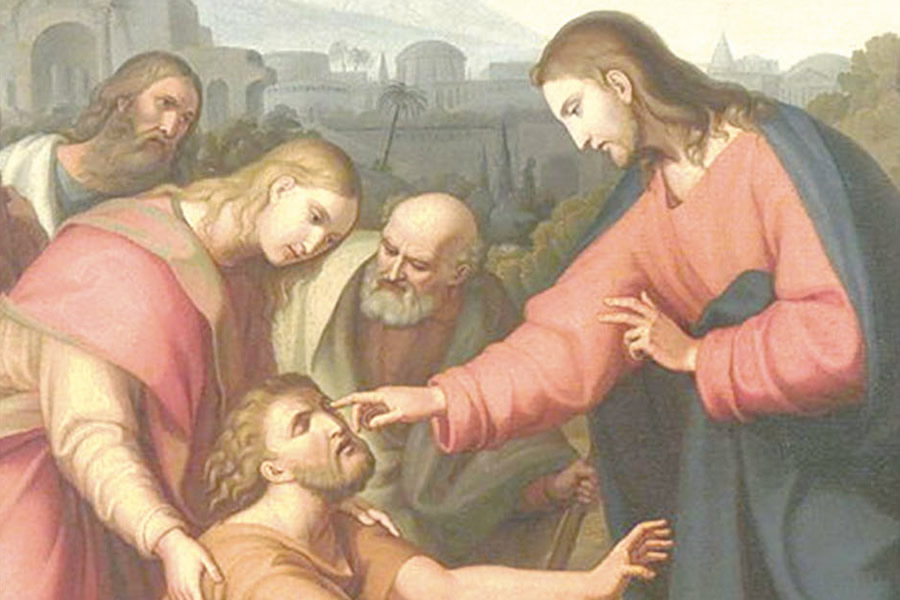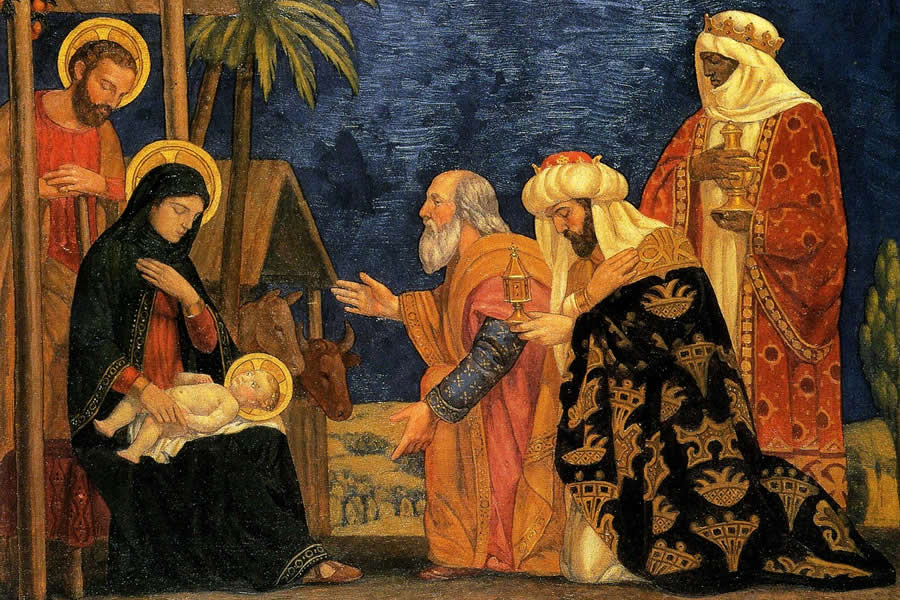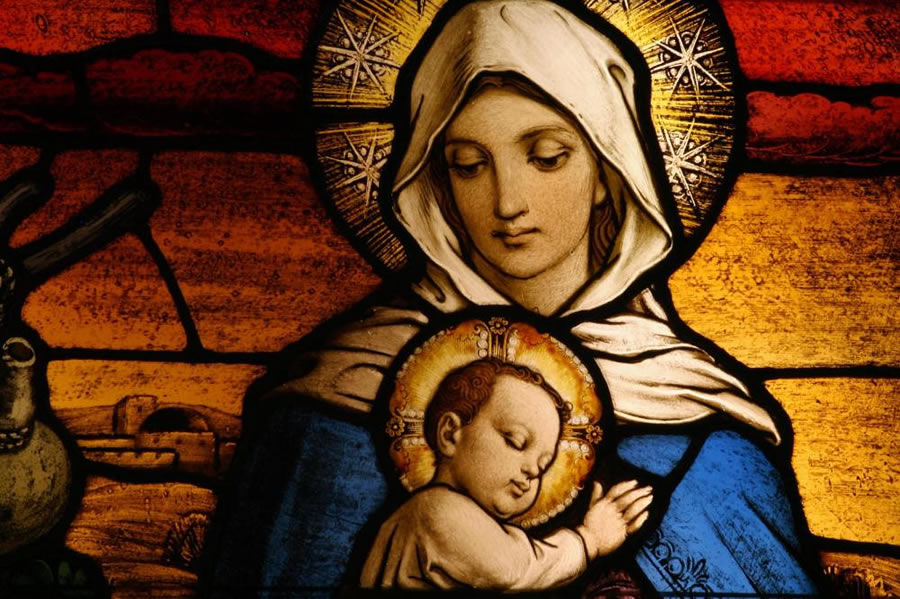St. Francis of Assisi Weekly Reflections

I Am the Resurrection and the Life
03-26-2023Weekly ReflectionWe Celebrate Worship Resource, Vol. 48, No. 1Today we hear John’s dramatic account of Jesus raising Lazarus from the dead. Ezekiel foreshadows this event when he tells his people that one day God will raise them from their graves. God’s spirit will give them life. But that spirit is not accepted by all. In the Gospel, Jesus reveals to Martha, “I am the resurrection and the life,” and calls forth Lazarus from the tomb (John 11:25). John tells us that many who witness this event begin to believe. However, we don’t hear his next verse: “But some of them went to the Pharisees and told them what Jesus had done” (11:53). Restoring the life of his dear friend directly leads to the loss of his own. Jesus places a greater value on the life he gives that on the life he has. For the life that Jesus gains is the resurrected life in which we all share—the life, as Paul wrote, that God gives to our mortal bodies through the Spirit of God dwelling in us.
How does knowing that the Spirit of God dwells in you change your outlook on life?
Yo Soy La Resurrección Y La Vida
Hoy escuchamos el relato dramático de Juan sobre Jesús resucitando a Lázaro de entre los muertos. Ezequiel presagia este evento cuando le dice a su pueblo que un día Dios los levantará de sus tumbas. El espíritu de Dios les dará vida. Pero ese espíritu no es aceptado por todos. En el Evangelio, Jesús le revela a Marta: “Yo soy la resurrección y la vida”, y llama a Lázaro de la tumba (Juan 11:25). Juan nos dice que muchos de los que presencian este evento comienzan a creer. Sin embargo, no escuchamos su siguiente versículo: “Pero algunos de ellos fueron a los fariseos y les contaron lo que Jesús había hecho” (11:53). Restaurar la vida de su querido amigo conduce directamente a la pérdida de la suya. Jesús valora más la vida que da que la vida que tiene. Porque la vida que Jesús gana es la vida resucitada en la que todos compartimos, como escribió Pablo, que Dios da a nuestros cuerpos mortales a través del Espíritu de Dios que mora en nosotros.
¿De qué manera el saber que el Espíritu de Dios mora en ti cambia tu perspectiva de la vida?

The Light of Christ
03-19-2023Weekly ReflectionWe Celebrate Worship Resource, Vol. 48, No. 1Can we see with eyes of faith? The blind man in the Gospel cannot see at all, but after Jesus heals him he comes progressively closer to seeing with eyes of faith. “The man called Jesus” becomes “a prophet,” then one “from God,” and finally the “the Son of Man” and “Lord” (John 9:11, 17, 33, 35, 38). Meanwhile, the Pharisees—with no apparent visual impairment—become more and more spiritually blind, failing to see past their own misconceptions of sin and disability. In the first reading, Samuel also initially fails to see as God sees, but comes to recognize David as Saul’s heir. Jesus tells his disciples, “While I am in the world, I am the light of world” (John 9:5). Let us remind ourselves that Jesus still is in the world: in us as we gather here together, in the Eucharist, in the person in need, and within ourselves as we act in his name. May the light of Christ, which “produces every kind of goodness and righteousness and truth” (Ephesians 5:9), give us eyes of faith, allowing us to see as God sees so that we can see peace where others see conflict, hope where others see despair, love where others see enmity.
With the light of Christ in you, what goodness, righteousness, and truth can you produce for all to see?
La Luz De Cristo
¿Podemos ver con los ojos de la fe? El ciego del Evangelio no puede ver nada, pero después de que Jesús lo sana, se acerca progresivamente a ver con los ojos de la fe. “El hombre llamado Jesús” se convierte en “un profeta”, después en uno enviado “de Dios”, y finalmente el “Hijo del Hombre” y “Señor” (Juan 9:11, 17, 33, 35, 38). Mientras tanto, los fariseos, sin discapacidad visual aparente, se vuelven cada vez más ciegos espiritualmente, y no pueden ver más allá de sus propios conceptos erróneos sobre el pecado y la discapacidad. En la primera lectura, Samuel inicialmente tampoco ve como Dios ve, pero llega a reconocer a David como el heredero de Saúl. Jesús les dice a sus discípulos: “Mientras estoy en el mundo, soy la luz del mundo” (Juan 9:5). Recordemos que Jesús todavía está en el mundo: en nosotros cuando nos reunimos aquí, en la Eucaristía, en la persona necesitada, y dentro de nosotros mismos cuando actuamos en su nombre. Que la luz de Cristo, que “produce toda clase de bondad, justicia y verdad” (Efesios 5:9), danos ojos de fe, permitiéndonos ver como Dios ve para que podamos ver paz donde otros ven conflicto, esperanza donde otros ven desesperación, amor donde otros ven enemistad.
¿Con la luz de Cristo en ti, ¿qué bondad, justicia y verdad puedes producir para que todos la vean?

Living Water
03-12-2023Weekly ReflectionWe Celebrate Worship Resource, Vol. 48, No. 1Water. Without it, we would not long survive. In ancient times, entire villages and towns would develop around a reliable well. In today’s Gospel, we meet a Samaritan woman on a daily trip to Jacob’s well. There she meets a stranger who offers her a different kind of water: water that will quench one’s thirst forever, “water welling up to eternal life” (John4:14). This living water, water the woman dearly wants as soon as she hears of it, is the very water poured over us in baptism. We already have within ourselves the living water that Jesus offers. This living water can satisfy so many of our thirsts: our thirst for eternal life, our thirst for meaning, our thirst for God. In the Sinai desert, the Lord gave life sustaining water to the Chosen People despite their grumbling. At Jacob’s well, Jesus slaked the deep thirst of the Samaritan woman despite her checkered past. In Jesus, God pours out of the water of eternal life despite our sinfulness. To this we testify
How does Jesus satisfy your thirst? How can your share that with others?
Agua Viva
Agua. Sin ella, no sobreviviríamos muchotiempo. En la antigüedad, pueblos yciudades enteras se desarrollaban alrededor de un pozo. En el evangelio de hoynos encontramos con una mujer samaritana enun viaje diario al pozo de Jacob. Allí conoce aun extraño que le ofrece otra clase de agua: agua que saciarála sed para siempre, “agua que brota para vida eterna” (Juan4:14). Esta agua viva, el agua que la mujer anhela tan prontocomo la oye, es el agua misma que se derrama sobre nosotrosen el bautismo. Ya tenemos dentro de nosotros el agua vivaque ofrece Jesús. Esta agua viva puede saciar muchas denuestras sed: nuestra sed de vida eterna, nuestra sed desentido, nuestra sed de Dios. En el desierto del Sinaí, el Señorle dio agua vital al Pueblo Elegido a pesar de sus quejas. En elpozo de Jacob, Jesús sació la profunda sed de la mujersamaritana a pesar de su pasado accidentado. En Jesús, Diosbrota del agua de la vida eterna a pesar de nuestrapecaminosidad. De esto damos testimonio.
¿Cómo satisface Jesús tu sed? ¿Cómo puedes compartir esocon los demás?

Listen to Him
03-05-2023Weekly ReflectionWe Celebrate Worship Resource, Vol. 48, No. 1Jesus’ transfiguration, of which we hear today, comes at a pivotal time in his mission. He has just told his disciples that he must go to Jerusalem, where he will be killed, then raised on the third day. Peter, who had just confessed Jesus as the Messiah, immediately rebukes him. Jesus responds, “Get behind me, Satan!” (Matthew 16:23), for Peter is denying the Messiah’s true mission. He then tells his disciples that they must deny themselves, take up their crosses, and follow him. “Whoever loses his [or her] life for my sake will find it” (16:25). One week later, Jesus leads his closest disciples up the mountain. They are likely still dumbfounded by his demanding words. Now, while he is transfigured, they hear God say the words as when Jesus was baptized, but this time adding, “Listen to him” (17:5). My beloved Son told you he would have to suffer and die. Listen to him. He told you he would be raised. Listen to him. He told you that you must deny yourself and take up your cross. Listen to him. Two thousand years later our transfigured Lord challenges us to do the same. Listen to him.
What cross is Jesus asking you to bear? Are you ready to accept that challenge?
Escúchenlo
La transfiguración de Jesús, de la que escuchamos hoy, llega en un momento crucial en su misión. Acaba de decir a sus discípulos que debe ir a Jerusalén, donde lo matarán y resucitará al tercer día. Pedro, que acababa de confesar a Jesús como el Mesías, inmediatamente lo reprende. Jesús le dice: "¡Quítate de delante de mí, Satanás!" (Mateo 16:23), pues Pedro está negando la verdadera misión del Mesías. Luego les dice a sus discípulos que deben negarse a sí mismos, tomar sus cruces y seguirlo. “El que pierda su vida por causa de mí, la hallará” (16:25). Una semana después, Jesús lleva a sus discípulos más cercanos a la montaña. Es probable que todavía estén estupefactos por sus exigentes palabras. Ahora, mientras está transfigurado, escuchan a Dios decir las palabras como cuando Jesús fue bautizado, pero esta vez agregó: “Escúchenlo” (17:5). Mi amado Hijo os dijo que tendría que sufrir y morir. Escúchenlo. Les dijo que sería resucitado. Escúchenlo. Les dijo que deberían negarse a si mismos y tomar su cruz. Escúchenlo. Dos mil años después, nuestro Señor transfigurado nos desafía a hacer lo mismo. Escúchenlo.
¿Qué cruz te pide Jesús que lleves? ¿Estás listo para aceptar ese desafío?

Resisting Temptation
02-26-2023Weekly ReflectionWe Celebrate Worship Resource, Vol. 48, No. 1To be human is to be tempted. All of us are tempted, sometimes quite often, to do something we know we shouldn’t or to shirk a responsibility to do something we should. Adam and Eve are both tempted in the garden of Eden. The serpent cunningly makes the prospect of eating the fruit of the fateful tree both innocuous and appealing. Eve and Adam hardly hesitate before succumbing to temptation. Jesus, fully divine and fully human, is tempted as well. Three times he is tempted by the devil in the desert. Each time Jesus resist, responding with words from scripture, the word to which he was sent to testify, the word he enfleshes. We are likely to be tempted many times during this season of Lent, and not only regarding our Lenten commitments. Jesus himself has provided a model of resisting. Recall that the Holy Spirit, who descended upon Jesus at his baptism, accompanies him in the desert. As baptized Christians, the Holy Spirit accompanies us as well. May the Holy Spirit strengthen us as we face temptation.
Recall a time recently when you gave in to temptation. How will you resist temptation like that the next time?
Resistiendo La Tentación
Ser humano es ser tentado. Con frecuencia nos sentimos tentados a hacer algo que no debemos o eludimos responsabilidades de lo que debemos hacer. Adán y Eva fueron tentados en el jardín del Edén por la serpiente a comer el fruto, del árbol prohibido. Ellos apenas dudaron de caer en la tentación. Jesús, plenamente divino y plenamente humano, también es tentado. Tres veces es tentado por el diablo en el desierto. Cada vez que Jesús resiste, responde con palabras de la Escritura, la palabra de la que fue enviado a testificar, la palabra que encarna. Es probable que seamos tentados muchas veces durante esta temporada de Cuaresma, y no solo con respecto a nuestros compromisos de Cuaresma. Jesús mismo ha proporcionado un modelo de resistencia. Recordad que el Espíritu Santo, que descendió sobre Jesús en su bautismo, le acompaña en el desierto. Como cristianos bautizados, el Espíritu Santo también nos acompaña. Que el Espíritu Santo nos fortalezca al enfrentar la tentación.
Recuerda alguna reciente ocasión en la que cediste a la tentación. ¿Cómo resistirás una tentación como esa la próxima vez?

Love Your Enemies
02-19-2023Weekly ReflectionWe Celebrate Worship Resource, Vol. 48, No. 1In the last sentence of today’s Gospel, Jesus exhorts his disciples to be perfect. But who among us is perfect? Who could be? We all fail from time to time, and that is the reason the gifts of forgiveness, reconciliation, and ultimately, redemption are so precious. It is with these gifts in mind that we should follow Jesus’ directives to love our enemies, to turn the other cheek, to give even more generously to those who take from us. It is so easy to find fault with each other in so many ways. We should take the time to look at the world from God’s point of view. Approximately eight billion people living on this planet and every one of them is a child of God. God would not refuse a single one of them sunshine or rain. God would not refuse a single one of them forgiveness, reconciliation, or redemption. To God, we are all sisters and brothers. When Jesus called on his disciples to be perfect, he reminded them that their heavenly Father is perfect. May the perfection with which God loves all the children of the world motivate us to try to do the same.
Can you accept the demand to love your enemies? How does loving your enemies transform the way you feel about yourself?
Ama A Tus Enemigos
En la última frase del Evangelio de hoy, Jesús exhorta a sus discípulos a ser perfectos. Pero, ¿quién de nosotros es perfecto? ¿Quién podría ser? Todos fallamos de vez en cuando, y esa es la razón por la que los dones del perdón, la reconciliación y, en última instancia, la redención son tan preciosos. Es con estos dones en mente que debemos seguir las directivas de Jesús de amar a nuestros enemigos, poner la otra mejilla, dar aún más generosamente a quienes nos quitan. Es tan fácil encontrar fallas entre sí de muchas maneras. Debemos tomarnos el tiempo para mirar el mundo desde el punto de vista de Dios. Aproximadamente ocho mil millones de personas viven en este planeta y cada uno de ellos es un hijo de Dios. Dios no negaría ni el sol ni la lluvia a ninguno de ellos. Dios no negaría a ninguno de ellos el perdón, la reconciliación o la redención. Para Dios, todos somos hermanos y hermanas. Cuando Jesús llamó a sus discípulos a ser perfectos, les recordó que su Padre celestial es perfecto. Que la perfección con la que Dios ama a todos los niños del mundo nos motive a intentar hacer lo mismo.
¿Puedes aceptar la petición de amar a tus enemigos? ¿Cómo transforma el amor a tus enemigos la forma en que te sientes contigo mismo?

Mending Relationships
02-12-2023Weekly ReflectionWe Celebrate Worship Resource, Vol. 48, No. 1What does it mean when we take something to heart? When we take something to heart, we don’t just go through the motions, we internalize it and make it part of our very self. Jesus challenges the supposed righteousness of the scribes and Pharisees because they fail to take God’s law to heart. Two hundred years earlier, Ben Sira had taught his Jewish readers that God did not give humanity free will in order to give us license to do what we want, but to give us the freedom to choose between right and wrong, with the realization that salvation comes to those who choose to keep God’s commands. Saint Paul teaches the Corinthians that God’s wisdom far exceeds our own, and that the Holy Spirit guides us in that wisdom. Jesus discusses murder and adultery, divorce and dishonesty with his disciples. Murder is forbidden, of course, but any unchecked anger can lead to hurting someone else, so we must prevent anger from taking control of us. Today, as we approach Valentine’s Day, let us take God’s law to heart and reconcile with those who have hurt us, and with those whom we have hurt.
With whom do you need to reconcile before you can offer your gift to God?
Reconciliando Relaciones
¿Qué significa cuando nos tomamos algo en serio? Cuando nos tomamos algo en serio, no solo hacemos los movimientos, sino que lo internalizamos y lo hacemos parte de nosotros mismos. Jesús desafía la supuesta justicia de los escribas y fariseos porque no toman en serio la ley de Dios. Doscientos años antes, Ben Sira había enseñado a sus lectores judíos que Dios no nos dio a la humanidad libre voluntad para darnos licencia para hacer lo que queremos, sino para darnos la libertad de elegir entre el bien y el mal, con la comprensión de que la salvación viene a aquellos que eligen guardar los mandamientos de Dios. San Pablo enseña a los corintios que la sabiduría de Dios supera con creces la nuestra y que el Espíritu Santo nos guía en esa sabiduría. Jesús habla de asesinato y adulterio, divorcio y deshonestidad con sus discípulos. El asesinato está prohibido, por supuesto, pero cualquier ira descontrolada puede causar daño a otra persona, por lo que debemos evitar que la ira se apodere de nosotros. Hoy, cuando nos acercamos al Día de San Valentín, tomemos en serio la ley de Dios y reconciliémonos con aquellos que nos han lastimado y con aquellos a quienes hemos lastimado.
¿Con quién necesitas reconciliarte antes de poder ofrecer tu regalo a Dios?

You Are the Light of the World
02-05-2023Weekly ReflectionWe Celebrate Worship Resource, Vol. 48, No. 1Are you a practicing Catholic? It seems silly to ask that question here, for you are practicing your faith at this very moment. “Attends Mass on Sundays” is often shorthand for “practicing Catholic”. But the word of God that we hear today offers a different perspective. In this passage from Isaiah, the Lord commands us to feed the hungry, to set the oppressed free, to shelter the homeless, to clothe the naked. This is what heals and vindicates us. This is what brings light to the gloom. We know from the feeling we get when we do something good for someone else that this is how to practice our faith. Saint Paul was the first to admit that he brought faith to others not through his words or his wisdom, but through a demonstration of the Holy Spirit working through him. Jesus calls his disciples the light of the world. Their light needs to shine for all, so “that they may see your good deeds and glorify your heavenly Father” (Matthew 5:16). This then is a necessary part of being a practicing Catholic: doing good for those in need. In doing so we practice our faith, we become vindicated in God’s eyes, and we live as God wills for us.
What will you do this week to shine as Christ for others, to practice your Catholic faith?
Ustedes Son La Luz Del Mundo
¿Eres un católico practicante? Parece tonto hacer esa pregunta aquí, porque estás practicando tu fe en este mismo momento. “Asistes a la Misa los domingos” a menudo es sinónimo a “católico practicante”. Pero la Palabra de Dios que escuchamos hoy ofrece una perspectiva diferente. En este pasaje de Isaías, el Señor nos ordena alimentar a los hambrientos, liberar a los oprimidos, para proteger a las personas sin hogar, para vestir a los desnudos. Esto es lo que nos cura y nos reivindica. Esto es lo que trae luz a la penumbra. Sabemos por el sentimiento que tenemos cuando hacemos algo bueno por otra persona que así es como practicar nuestra fe. San Pablo fue el primero en admitir que trajo fe a los demás, no a través de sus palabras o su sabiduría, sino a través de una demostración del Espíritu Santo que trabajaba a través de él. Jesús llama a sus discípulos la luz del mundo. Su luz debe brillar para todos, así que "pueden ver sus buenas acciones y glorificar a su Padre Celestial" (Mateo 5:16). Esta es una parte necesaria de ser un católico practicante: hacer el bien para los necesitados. Al hacerlo, practicamos nuestra fe, nos revendamos a los ojos de Dios, y vivimos como Dios desea para nosotros.
¿Qué harás esta semana para brillar como Cristo para los demás, para practicar tu fe católica?

Resisting Temptation
02-26-2023Weekly ReflectionWe Celebrate Worship Resource, Vol. 48, No. 1To be human is to be tempted. All of us are tempted, sometimes quite often, to do something we know we shouldn’t or to shirk a responsibility to do something we should. Adam and Eve are both tempted in the garden of Eden. The serpent cunningly makes the prospect of eating the fruit of the fateful tree both innocuous and appealing. Eve and Adam hardly hesitate before succumbing to temptation. Jesus, fully divine and fully human, is tempted as well. Three times he is tempted by the devil in the desert. Each time Jesus resist, responding with words from scripture, the word to which he was sent to testify, the word he enfleshes. We are likely to be tempted many times during this season of Lent, and not only regarding our Lenten commitments. Jesus himself has provided a model of resisting. Recall that the Holy Spirit, who descended upon Jesus at his baptism, accompanies him in the desert. As baptized Christians, the Holy Spirit accompanies us as well. May the Holy Spirit strengthen us as we face temptation.
Recall a time recently when you gave in to temptation. How will you resist temptation like that the next time?
Resistiendo La Tentación
Ser humano es ser tentado. Con frecuencia nos sentimos tentados a hacer algo que no debemos o eludimos responsabilidades de lo que debemos hacer. Adán y Eva fueron tentados en el jardín del Edén por la serpiente a comer el fruto, del árbol prohibido. Ellos apenas dudaron de caer en la tentación. Jesús, plenamente divino y plenamente humano, también es tentado. Tres veces es tentado por el diablo en el desierto. Cada vez que Jesús resiste, responde con palabras de la Escritura, la palabra de la que fue enviado a testificar, la palabra que encarna. Es probable que seamos tentados muchas veces durante esta temporada de Cuaresma, y no solo con respecto a nuestros compromisos de Cuaresma. Jesús mismo ha proporcionado un modelo de resistencia. Recordad que el Espíritu Santo, que descendió sobre Jesús en su bautismo, le acompaña en el desierto. Como cristianos bautizados, el Espíritu Santo también nos acompaña. Que el Espíritu Santo nos fortalezca al enfrentar la tentación.
Recuerda alguna reciente ocasión en la que cediste a la tentación. ¿Cómo resistirás una tentación como esa la próxima vez?

Love Your Enemies
02-19-2023Weekly ReflectionWe Celebrate Worship Resource, Vol. 48, No. 1In the last sentence of today’s Gospel, Jesus exhorts his disciples to be perfect. But who among us is perfect? Who could be? We all fail from time to time, and that is the reason the gifts of forgiveness, reconciliation, and ultimately, redemption are so precious. It is with these gifts in mind that we should follow Jesus’ directives to love our enemies, to turn the other cheek, to give even more generously to those who take from us. It is so easy to find fault with each other in so many ways. We should take the time to look at the world from God’s point of view. Approximately eight billion people living on this planet and every one of them is a child of God. God would not refuse a single one of them sunshine or rain. God would not refuse a single one of them forgiveness, reconciliation, or redemption. To God, we are all sisters and brothers. When Jesus called on his disciples to be perfect, he reminded them that their heavenly Father is perfect. May the perfection with which God loves all the children of the world motivate us to try to do the same.
Can you accept the demand to love your enemies? How does loving your enemies transform the way you feel about yourself?
Ama A Tus Enemigos
En la última frase del Evangelio de hoy, Jesús exhorta a sus discípulos a ser perfectos. Pero, ¿quién de nosotros es perfecto? ¿Quién podría ser? Todos fallamos de vez en cuando, y esa es la razón por la que los dones del perdón, la reconciliación y, en última instancia, la redención son tan preciosos. Es con estos dones en mente que debemos seguir las directivas de Jesús de amar a nuestros enemigos, poner la otra mejilla, dar aún más generosamente a quienes nos quitan. Es tan fácil encontrar fallas entre sí de muchas maneras. Debemos tomarnos el tiempo para mirar el mundo desde el punto de vista de Dios. Aproximadamente ocho mil millones de personas viven en este planeta y cada uno de ellos es un hijo de Dios. Dios no negaría ni el sol ni la lluvia a ninguno de ellos. Dios no negaría a ninguno de ellos el perdón, la reconciliación o la redención. Para Dios, todos somos hermanos y hermanas. Cuando Jesús llamó a sus discípulos a ser perfectos, les recordó que su Padre celestial es perfecto. Que la perfección con la que Dios ama a todos los niños del mundo nos motive a intentar hacer lo mismo.
¿Puedes aceptar la petición de amar a tus enemigos? ¿Cómo transforma el amor a tus enemigos la forma en que te sientes contigo mismo?

Mending Relationships
02-12-2023Weekly ReflectionWe Celebrate Worship Resource, Vol. 48, No. 1What does it mean when we take something to heart? When we take something to heart, we don’t just go through the motions, we internalize it and make it part of our very self. Jesus challenges the supposed righteousness of the scribes and Pharisees because they fail to take God’s law to heart. Two hundred years earlier, Ben Sira had taught his Jewish readers that God did not give humanity free will in order to give us license to do what we want, but to give us the freedom to choose between right and wrong, with the realization that salvation comes to those who choose to keep God’s commands. Saint Paul teaches the Corinthians that God’s wisdom far exceeds our own, and that the Holy Spirit guides us in that wisdom. Jesus discusses murder and adultery, divorce and dishonesty with his disciples. Murder is forbidden, of course, but any unchecked anger can lead to hurting someone else, so we must prevent anger from taking control of us. Today, as we approach Valentine’s Day, let us take God’s law to heart and reconcile with those who have hurt us, and with those whom we have hurt.
With whom do you need to reconcile before you can offer your gift to God?
Reconciliando Relaciones
¿Qué significa cuando nos tomamos algo en serio? Cuando nos tomamos algo en serio, no solo hacemos los movimientos, sino que lo internalizamos y lo hacemos parte de nosotros mismos. Jesús desafía la supuesta justicia de los escribas y fariseos porque no toman en serio la ley de Dios. Doscientos años antes, Ben Sira había enseñado a sus lectores judíos que Dios no nos dio a la humanidad libre voluntad para darnos licencia para hacer lo que queremos, sino para darnos la libertad de elegir entre el bien y el mal, con la comprensión de que la salvación viene a aquellos que eligen guardar los mandamientos de Dios. San Pablo enseña a los corintios que la sabiduría de Dios supera con creces la nuestra y que el Espíritu Santo nos guía en esa sabiduría. Jesús habla de asesinato y adulterio, divorcio y deshonestidad con sus discípulos. El asesinato está prohibido, por supuesto, pero cualquier ira descontrolada puede causar daño a otra persona, por lo que debemos evitar que la ira se apodere de nosotros. Hoy, cuando nos acercamos al Día de San Valentín, tomemos en serio la ley de Dios y reconciliémonos con aquellos que nos han lastimado y con aquellos a quienes hemos lastimado.
¿Con quién necesitas reconciliarte antes de poder ofrecer tu regalo a Dios?

You Are the Light of the World
02-05-2023Weekly ReflectionWe Celebrate Worship Resource, Vol. 48, No. 1Are you a practicing Catholic? It seems silly to ask that question here, for you are practicing your faith at this very moment. “Attends Mass on Sundays” is often shorthand for “practicing Catholic”. But the word of God that we hear today offers a different perspective. In this passage from Isaiah, the Lord commands us to feed the hungry, to set the oppressed free, to shelter the homeless, to clothe the naked. This is what heals and vindicates us. This is what brings light to the gloom. We know from the feeling we get when we do something good for someone else that this is how to practice our faith. Saint Paul was the first to admit that he brought faith to others not through his words or his wisdom, but through a demonstration of the Holy Spirit working through him. Jesus calls his disciples the light of the world. Their light needs to shine for all, so “that they may see your good deeds and glorify your heavenly Father” (Matthew 5:16). This then is a necessary part of being a practicing Catholic: doing good for those in need. In doing so we practice our faith, we become vindicated in God’s eyes, and we live as God wills for us.
What will you do this week to shine as Christ for others, to practice your Catholic faith?
Ustedes Son La Luz Del Mundo
¿Eres un católico practicante? Parece tonto hacer esa pregunta aquí, porque estás practicando tu fe en este mismo momento. “Asistes a la Misa los domingos” a menudo es sinónimo a “católico practicante”. Pero la Palabra de Dios que escuchamos hoy ofrece una perspectiva diferente. En este pasaje de Isaías, el Señor nos ordena alimentar a los hambrientos, liberar a los oprimidos, para proteger a las personas sin hogar, para vestir a los desnudos. Esto es lo que nos cura y nos reivindica. Esto es lo que trae luz a la penumbra. Sabemos por el sentimiento que tenemos cuando hacemos algo bueno por otra persona que así es como practicar nuestra fe. San Pablo fue el primero en admitir que trajo fe a los demás, no a través de sus palabras o su sabiduría, sino a través de una demostración del Espíritu Santo que trabajaba a través de él. Jesús llama a sus discípulos la luz del mundo. Su luz debe brillar para todos, así que "pueden ver sus buenas acciones y glorificar a su Padre Celestial" (Mateo 5:16). Esta es una parte necesaria de ser un católico practicante: hacer el bien para los necesitados. Al hacerlo, practicamos nuestra fe, nos revendamos a los ojos de Dios, y vivimos como Dios desea para nosotros.
¿Qué harás esta semana para brillar como Cristo para los demás, para practicar tu fe católica?

We Depend on God
01-29-2023Weekly ReflectionWe Celebrate Worship Resource, Vol. 48, No. 1What does it mean to be truly humble, not merely avoiding boastfulness and arrogance, and certainly not full of the false humility that just draws attention to itself? To see what humility really means, let’s look at today’s readings. Zephaniah says those who are humble observe God’s law. They realize that God’s law provides a better foundation for living than their own selfish interests. The prophet also says that the humble and the lowly take refuge in the Lord. They rely on a higher power for safety and comfort. Saint Paul draws a clear line between those who recognize that their calling is from God and those who ignore that. Those who ignore it think they are wise and strong and noble, and that they got this way on their own. But those who live in Christ realize that they share in the wisdom and power of God, enabling them to boast in the Lord. They acknowledge that God is the source of all our abilities and talents. Jesus calls the meek and the poor in spirit, the insulted and persecuted, blessed. They are blessed, for they have the humility to recognize that they are not in control of their own fates, that they must rely on God for salvation and satisfaction. To be truly humble is to recognize that ultimately none of us is in control of our own success. We depend on God.
How can you grow in humility? Can you recognize the blessedness of your dependence on God?
Dependemos De Dios
¿Qué significa ser verdaderamente humilde, no simplemente evitando la jactancia y la arrogancia, y ciertamente no lleno de la falsa humildad que solo llama la atención sobre sí misma? Para ver lo que realmente significa la humildad, veamos las lecturas de hoy. Sofonías dice que aquellos que son humildes observan la ley de Dios. Se dan cuenta de que la ley de Dios proporciona una mejor base para vivir que sus propios intereses egoístas. El profeta también dice que los humildes y los humildes se refugian en el Señor. Se basan en una potencia superior para la seguridad y la comodidad. San Pablo traza una línea clara entre aquellos que reconocen que su llamado es de Dios y aquellos que lo ignoran. Aquellos que lo ignoran piensan que son sabios, fuertes y nobles, y que lo lograron por sí mismos. Pero los que viven en Cristo se dan cuenta de que comparten la sabiduría y el poder de Dios, lo que les permite gloriarse en el Señor. Reconocen que Dios es la fuente de todas nuestras habilidades y talentos. Jesús llama bienaventurados a los mansos y pobres de espíritu, a los ultrajados y perseguidos. Son bendecidos, porque tienen la humildad de reconocer que no tienen el control de sus propios destinos, deben confiar en Dios para su salvación y satisfacción. Ser verdaderamente humilde es reconocer que, en última instancia, ninguno de nosotros tiene el control de nuestro propio éxito. Dependemos de Dios.
¿Cómo puedes crecer en humildad? ¿Puedes reconocer la bienaventuranza de tu dependencia de Dios?

The Kingdom of Heaven is at Hand
01-22-2023Weekly ReflectionWe Celebrate Worship Resource, Vol. 48, No. 1Simon Peter couldn’t have guessed what the future held for him. We know now that over the next three years he goes from unbounded exuberance—trying to walk on water—to brutal disloyalty—denying that he even knows Jesus. He will be reprimanded— “Get behind me, Satan!” — and rewarded— “Upon this rock I will build my church” (Matthew 16:18, 23). But on this day on the shore of the Sea of Galilee, having just met the man and not knowing what he was getting himself into, he accepts at once, leaving a steady job to become a fisher of others. Only after he joins Jesus is he able to see him teach, proclaim the gospel, and heal the sick. Jesus’ first message is the same as John the Baptist’s, but the meaning of “the kingdom of heaven is at hand” had changed (Matthew 3:2, 4:17). For John, the kingdom was immanent, about to come. In Jesus, the kingdom is immanent, here with us. So too Jesus is immanent now, here in this assembly, here in the Eucharist, here in us and in those we meet. We don’t know what our future holds, but we too are invited to come with Jesus, to fish for others, and to help make the kingdom immanent right here and now.
How are you called to be a disciple? How will you respond?
El Reino De Los Cielos Se Ha Acercado
Simón Pedro no podría haber adivinado lo que le deparaba el futuro. Ahora sabemos que durante los próximos tres años él pasa de la exuberancia sin límites, tratando de caminar sobre el agua, a la deslealtad brutal, negando que conoce a Jesús. Será amonestado: “¡Quítate de delante de mí, Satanás !” — y recompensado— “Sobre esta roca edificaré mi iglesia” (Mateo 16:18, 23). Pero ese día en la orilla del mar de Galilea, recién conocido al hombre y sin saber en qué se estaba metiendo, acepta de inmediato, dejando un trabajo estable para convertirse en pescador de otros. Solo después de unirse a Jesús, puede verlo enseñar, proclamar el evangelio y sanar a los enfermos. El primer mensaje de Jesús es el mismo que el de Juan el Bautista, pero el significado de “el reino de los cielos se ha acercado” había cambiado (Mateo 3:2, 4:17). Para Juan, el reino era inminente, estaba a punto de llegar. En Jesús, el reino es inmanente, aquí con nosotros. Así también Jesús es inmanente ahora, aquí en esta asamblea, aquí en la Eucaristía, aquí en nosotros y en aquellos con quienes nos encontramos. No sabemos lo que nos depara el futuro, pero también estamos invitados a venir con Jesús, a pescar para otros y a ayudar a que el reino sea inmanente aquí y ahora.
¿Cómo estás llamado a ser un discípulo? ¿Cómo responderás?

Shine the Light of Christ
01-15-2023Weekly ReflectionWe Celebrate Worship Resource, Vol. 48, No. 1Isaiah, Paul, and John. Each one prepares us for the coming of the Lord. Isaiah calls the people of Israel back home after many years of exile in Babylon. But they are not the only ones. God has made the prophet a light to the nations, so that salvation can reach all the way to the ends of the earth. This sounds joyous, and it is, but it is also challenging. Isaiah welcomes not just descendants of Abraham but everyone, even enemies, even those who had just held them captive. But this is the way light works. It does not discriminate; it shines on everyone. Paul, apostle to the Gentiles, knows this well. Corinth was nearly a thousand miles from Bethlehem or Galilee or Jerusalem. Yet its people were just as welcome to become Christian, to become brothers and sisters in faith, as those who could trace their lineage back to David. John the Baptizer, the mystic emerging from his time in the wilderness, saw the Holy Spirit descend upon Jesus when he baptized him. Like light, the Spirit illuminates the whole world. Today we are called to follow their lead—shining the light of Christ, passing on Spirit, spreading the saving grace of God throughout our family, our community, and our world.
Is there a situation in your life that can use God’s welcome, God’s grace, God’s mercy? How can you apply those to that situation?
Brilla Con La Luz De Cristo
Isaías, Pablo y Juan. Cada uno nos prepara para la venida del Señor. Isaías llama al pueblo de Israel de vuelta a casa después de muchos años de exilio en Babilonia. Pero no son los únicos. Dios ha hecho del profeta una luz para las naciones, para que la salvación llegue hasta los confines de la tierra. Esto suena alegre, y lo es, pero también es un desafío. Isaías da la bienvenida no solo a los descendientes de Abraham, sino a todos, incluso a los enemigos, incluso a aquellos que acababan de tenerlos cautivos. Pero así es como funciona la luz. No discrimina; brilla en todos. Pablo, apóstol de los gentiles, lo sabe bien. Corinto estaba a casi mil millas de Belén, Galilea o Jerusalén. Sin embargo, su gente era tan bienvenida para convertirse en cristianos, para convertirse en hermanos y hermanas en la fe, como aquellos que podían rastrear su linaje hasta David. Juan el Bautista, el místico que emerge de su tiempo en el desierto, vio al Espíritu Santo descender sobre Jesús cuando lo bautizó. Como la luz, el Espíritu ilumina el mundo entero. Hoy estamos llamados a seguir su ejemplo: hacer brillar la luz de Cristo, transmitir el Espíritu, difundir la gracia salvadora de Dios en nuestra familia, nuestra comunidad y nuestro mundo.
¿Hay alguna situación en tu vida en que puedas usar la bienvenida de Dios, la gracia de Dios, la misericordia de Dios? ¿Cómo puedes aplicarlos a esa situación?

Where Can We Find Christ Today?
01-08-2023Weekly ReflectionWe Celebrate Worship Resource, Vol. 48, No. 1Where do you suppose the magi expected to end up when they began their journey from the east? A bright star like the one they had seen at its rising was regarded as a sign that a great ruler was born. As they traveled, they must have marveled at this especially bright star growing brighter and brighter each night as they drew closer to Bethlehem. We are told that their initial destination, however, was nearby Jerusalem. Of course! It was the most prominent city in the area, the capital of Judea, the site of the temple, the home of the king. Where else would they look for a newborn ruler as powerful as this star? But God’s signs are rarely straightforward as we would like. Much as David was the unexpected choice among Jesse’s sons, the Son of David was not found where the magi expected—not in Herod’s home, not in a palace, not in Jerusalem at all. They found the newborn king in a feeding trough, in a stable, in the last place they would have expected. Before his death, Jesus himself surprises his disciples as to where they can find him, telling them he is found in the least among them. Then and now, he can be found where we least expect him. May we reorient our vision.
Where can you look for Christ? Have others found Christ within you?
¿DONDE PODEMOS ENCONTRAR A CRISTO HOY?
¿Donde supones que los magos esperaban terminar cuando comenzaron su viaje desde el este? Una estrella brillante como la que habían visto salir era considerada una señal de que había nacido un gran gobernante. Mientras viajaban, deben haberse maravillado de esta estrella especialmente brillante que se hacía más y más brillante cada noche a medida que se acercaban a Belén. Se nos dice que su destino inicial, sin embargo, estaba cerca de Jerusalén. ¡Por supuesto! Era la ciudad más prominente de la zona, la capital de Judea, el sitio del templo, el hogar del rey. ¿Dónde más buscarían un gobernante recién nacido tan poderoso como esta estrella? Pero las señales de Dios rara vez son sencillas como nos gustaría. Por mucho que David fuera la elección inesperada entre los hijos de Isaí, el Hijo de David no fue encontrado donde los magos esperaban: ni en la casa de Herodes, ni en un palacio, ni en Jerusalén en absoluto. Encontraron al rey recién nacido en un comedero, en un establo, en el último lugar que habrían esperado. Antes de su muerte, el mismo Jesús sorprende a sus discípulos sobre dónde pueden encontrarlo, diciéndoles que se encuentra en los más pequeños entre ellos. Entonces y ahora, se le puede encontrar donde menos lo esperamos. Reorientemos nuestra visión.
¿Dónde puedes buscar a Cristo? ¿Han encontrado otros a Cristo dentro de ti?

Bearing Christ to the World
01-01-2023Weekly ReflectionWe Celebrate Worship Resource, Vol. 48, No. 1After their rescue from slavery in Egypt, the Chosen People prepared to embark on a long and difficult journey through the desert to the promised land. To mark this new beginning, Aaron and his sons called down God’s blessings, God’s favor, and God’s peace upon the people. Centuries later, Jesus’ birth represented an even greater new beginning: Through Mary, God became incarnate in our world. The shepherds were so excited by the news that they had heard. How appropriate we celebrate this new beginning on New Year’s Day, the day that marks the start of a new year, a time when we look forward to the promise of a clean slate, resolve to make changes in our lives, and renew our hope in God’s promise to humankind: that Jesus was born into this world to live with us, to die for us, and to save us from our sins. Mary humbly, selflessly, and obediently bore Christ to the world. May we follow her example in this new year and bear Christ to God’s children in our own little corner of the world.
How can you bring hope and joy to others by bearing Christ to the world?
Llevando A Cristo Al Mundo
Tras su rescate de la esclavitud en Egipto, el Pueblo Elegido se preparó para emprender un largo y difícil viaje a través del desierto hacia la tierra prometida. Para marcar este nuevo comienzo, Aarón y sus hijos invocaron las bendiciones de Dios, el favor de Dios y la paz de Dios sobre el pueblo. Siglos más tarde, el nacimiento de Jesús representó un nuevo comienzo aún mayor: a través de María, Dios se encarnó en nuestro mundo. Los pastores estaban tan emocionados por la noticia que habían escuchado. Cuán apropiado es que celebremos este nuevo comienzo el día de Año Nuevo, el día que marca el comienzo de un nuevo año, un momento en el que esperamos la promesa de hacer borrón y cuenta nueva, decidimos hacer cambios en nuestras vidas y renovamos nuestra esperanza en la promesa de Dios a la humanidad: que Jesús nació en este mundo para vivir con nosotros, morir por nosotros y salvarnos de nuestros pecados. María humilde, desinteresada y obedientemente dio a luz a Cristo al mundo. Que sigamos su ejemplo en este nuevo año y llevemos a Cristo a los hijos de Dios en nuestro pequeño rincón del mundo.
¿Cómo puedes difundir esperanza y alegría a los demás llevando a Cristo al mundo?